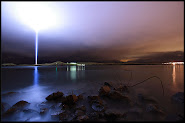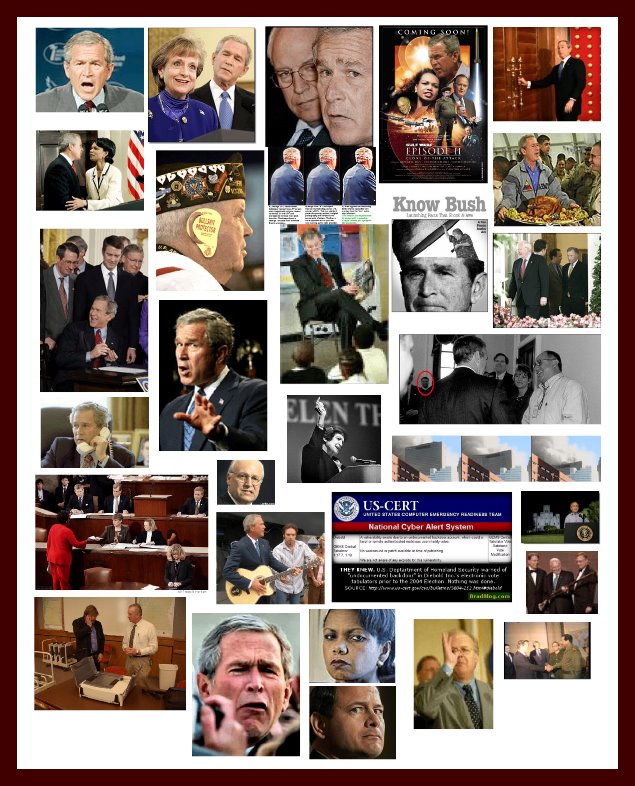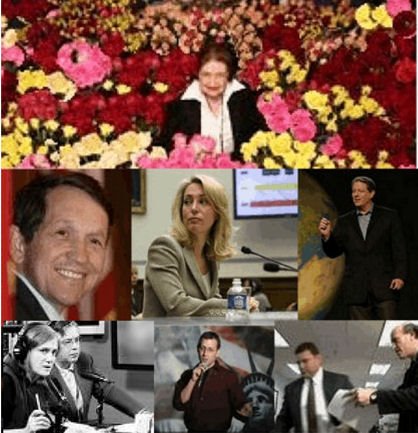Mary Mapes! You've got Mary Mapes?! Wow.
Okay, I confess. I spent months in 2005 researching what happened to Dan Rather. I would have finished, and written something up, but the story kept growing.
And I was suddenly interrupted by the Carter Baker Panel, ACVR, etc. and felt like I desperately had to focus on election theft.
And the rest is history.
But that summer, at the first Cindy Sheehan vigil, The Salt Lake Tribune captured the most outrageous photo of me at the moment when, as I spoke about getting the real news, I declared passionately, "Dan Rather was right!"
Whatever mistakes were made, he was right. Bush ducked out of his already plush Air National Guard gig and was AWOL - a spoiled selfish arrogant brat. And since then, he and his folk have lied, and sent others to their deaths. Grrrrrrrr.
Digging into the story, I found Rather's magnificent confrontive interview of Daddy in 1988, as well as a quote from Cheney about how Daddy Bush holds a grudge.
I also discovered that the man who ran the investigatory panel set up by CBS, Richard Thornburgh, who of course was Daddy's AG, has spent a lot of his time and energy at the Justice Department reclassifying documents as secret and covering for the antics of Neil and George W.
Then there's Bill Burkett, Rather's source, a man who was desperate to have the public hear about what he'd seen and what a corrupt man George W. Bush was.
Not only was Burkett THE WITNESS to Bush's National Guard files being cleansed, but his story was told by James Moore in his Bush's War for Re-Election: Iraq, the White House, and the People, released in early 2004, and Moore is also the co-author with Wayne Slater of Bush's Brain: How Karl Rove Made George W. Bush Presidential, the book revealing the kind of fiend that Karl Rove has always been.
Burkett was contacted after appearing with Moore, and memos were handed off in a non-trackable way. Burkett did nothing with them for months, until the swift-boating began.
It was a set up! And Bush/Rove got to take so many down.
I just want Mary to know, and Dan, that they've got a passionate, obnoxiously outspoken supporter here in li'l ol' Salt Lake.
I'm on hold now Brad - talk to me!
Yes, I got on, and by then I had reviewed some of my notes from 2005. I was always amazed by what I learned about Richard Thornburgh, who CBS picked to investigate the handling of the National Guard 60 Minutes story. I quickly asked if Mary was aware of Thornburgh's reputation as Bush 1's Attorney General. Afterwards, I followed up in Brad's comments:
To follow up on what I spoke about regarding Bush 1’s Attorney General, Dick Thornburgh, who ran the panel that investigated CBS’s National Guard story, here is a section from the an article in the March/April 1993 Columbia Journal Review by Russ W. Baker, "IRAQGATE, The Big One That (Almost) Got Away, Who Chased it – and Who Didn’t"
" ARMING SADDAM
The United States and its European allies have laws and policies designed to prevent arms and military technology from getting into the hands of developing countries, especially where there is a likelihood of their reckless deployment. If these controls were aimed at anyone, certainly they were aimed at the highly repressive, swaggering Iraqi regime, with its history of threatening both its neighbors and its citizens.
Still, when Saddam went to war against Iran, becoming the world’s chief practitioner of chemical warfare, U.S. realpolitikers dubbed him the lesser of two evils, and the one less likely to disrupt the oil flow. The essence of Iraqgate is that secret efforts to support him became the order of the day, both during his long war with Iran and afterward.
Much of what Saddam received from the West was not arms per se, but so-called dual-use technology – ultra sophisticated computers, armored ambulances, helicopters, chemicals, and the like, with potential civilian uses as well as military applications. We’ve learned by now that a vast network of companies, based in the U.S. and abroad, eagerly fed the Iraqi war machine right up until August 1990, when Saddam invaded Kuwait.
And we’ve learned that the obscure Atlanta branch of Italy’s largest bank, Banca Nazionale del Lavoro [BBT Note: a client of Baker Botts, the law firm of notorious Bush consigliere James Baker III], relying partially on U.S. taxpayer-guaranteed loans, funneled $ 5 billion to Iraq from 1985 to 1989. Some government-backed loans were supposed to be for agricultural purposes, but were used to facilitate the purchase of stronger stuff than wheat. Federal Reserve and Agriculture department memos warned of suspected abuses by Iraq, which apparently took advantage of the loans to free up funds for munitions. U.S. taxpayers have been left holding the bag for what looks like $ 2 billion in defaulted loans to Iraq.
All of this was not yet clear in August 1989, when FBI agents raided U.S. branches of BNL, hitting the jackpot in Atlanta. The branch manager in that city, Christopher Drogoul, was charged with making unauthorized, clandestine, and illegal loans to Iraq – some of which, according to the indictment, were used to purchase arms and weapons technology. Yet three months after the raid, White House officials went right on backing Saddam, approving $ 1 billion more in U.S. government loan guarantees for farm exports to Iraq, even though it was becoming clear that the country was beating plowshares into swords.
At the time, inquiring minds wondered whether Drogoul could possibly have acted alone in such a mammoth operation, as the U.S. government alleged. Was there a formal, secret plan to arm Iraq? And did the U.S. government engage in a massive coverup when evidence of such a plan began to emerge?
In fact, we now know that in February 1990, then Attorney General Dick Thornburgh blocked U.S. investigators from traveling to Rome and Istanbul to pursue the case. And that the lead investigator lacked the basic financial know-how to handle such an investigation, and made an extraordinarily feeble effort to get to the bottom of things.
More damningly, we know know that mid-level staffers at the commerce department altered Iraqi export licenses to obscure the exported materials’ military function – before sending the documents on to Congress, which was investigating the affair.
Eventually, it would turn out that elements of the U.S. government almost certainly knew that Drogoul was funneling U.S.-backed loans – intended for the purchase of agricultural products, machinery, trucks, and other U.S. goods – into dual-use technology and outright military technology. And that the British government was fully aware of the operations of Matrix Churchill, a British firm with an Ohio branch, which was not only at the center of the Iraqi procurement network but was also funded by BNL Atlanta. (Precision equipment supplied by Matrix Churchill was reportedly a target this January when the Western allies renewed their attack on Iraq).
It would later be alleged by bank executives that the Italian government, long a close U.S. ally as well as BNL’s ultimate owner, had knowledge of BNL’s loan diversions. It looked to some like an international coalition. As New York Times columnist William Safire argued last December 7, “Iraqgate is uniquely horrendous: a scandal about the systematic abuse of power by misguided leaders of three democratic nations to secretly finance the arms buildup of a dictator.”
Safire had been on the case since 1989, turning out slashing op-ed pieces. But readers of the Times’s news pages must have wondered where Safire’s body-blows were coming from, since the news columns contained almost nothing about Iraqgate for the longest time. "
In addition, this from Webster Tarpley’s George Bush: The Unauthorized Biography
The old imperialist idea of Theodore Roosevelt was quickly revived by the Bush administration during 1989. Through a series of actions by Attorney General Richard Thornburgh, the U.S. Supreme Court, and CIA Director William Webster, the Bush regime arrogated to itself a sweeping carte blanche for extraterritorial interference in the internal affairs of sovereign states, all in open defiance of the norms of international law.
These illegal innovations can be summarized under the heading of the “Thornburgh Doctrine.”
The Federal Bureau of Investigation arrogated to itself the “right” to search premises outside of U.S. territory and to arrest and kidnap foreign citizens outside of U.S. jurisdiction, all without the concurrence of the judicial process of the other countries whose territory was thus subject to violation.
U.S. armed forces were endowed with the “right” to take police measures against civilians.
The CIA demanded that an Executive Order prohibiting the participation of U.S. government officials and military personnel in the assassination of foreign political leaders, which had been issued by President Ford in October 1976, be rescinded.
There is every indication that this presidential ban on assassinations of foreign officials and politicians, which had been promulgated in response to the Church and Pike Committees’ investigations of CIA abuses, has indeed been abrogated.
To round out this lawless package, an opinion of the U.S. Supreme Court issued on February 28, 1990 permitted U.S. officials abroad to arrest (or kidnap) and search foreign citizens without regard to the laws or policy of the foreign nation subject to this interference.
Through these actions, the Bush regime effectively staked its claim to universal extraterritorial jurisdiction, the classic posture of an empire seeking to assert universal police power. The Bush regime aspired to the status of a world power “legibus solutus,” a superpower exempted from all legal restrictions.
Isn’t history astonishing? No wonder they had to get rid of Rather. He had an historical perspective.
And while you can see him on “Rather Reports” - Comcast refuses to include HDnet on its schedule. And the show does not podcast. There are, however, transcripts. And suddenly, they are making some of the episodes available to watch online.


















No comments:
Post a Comment